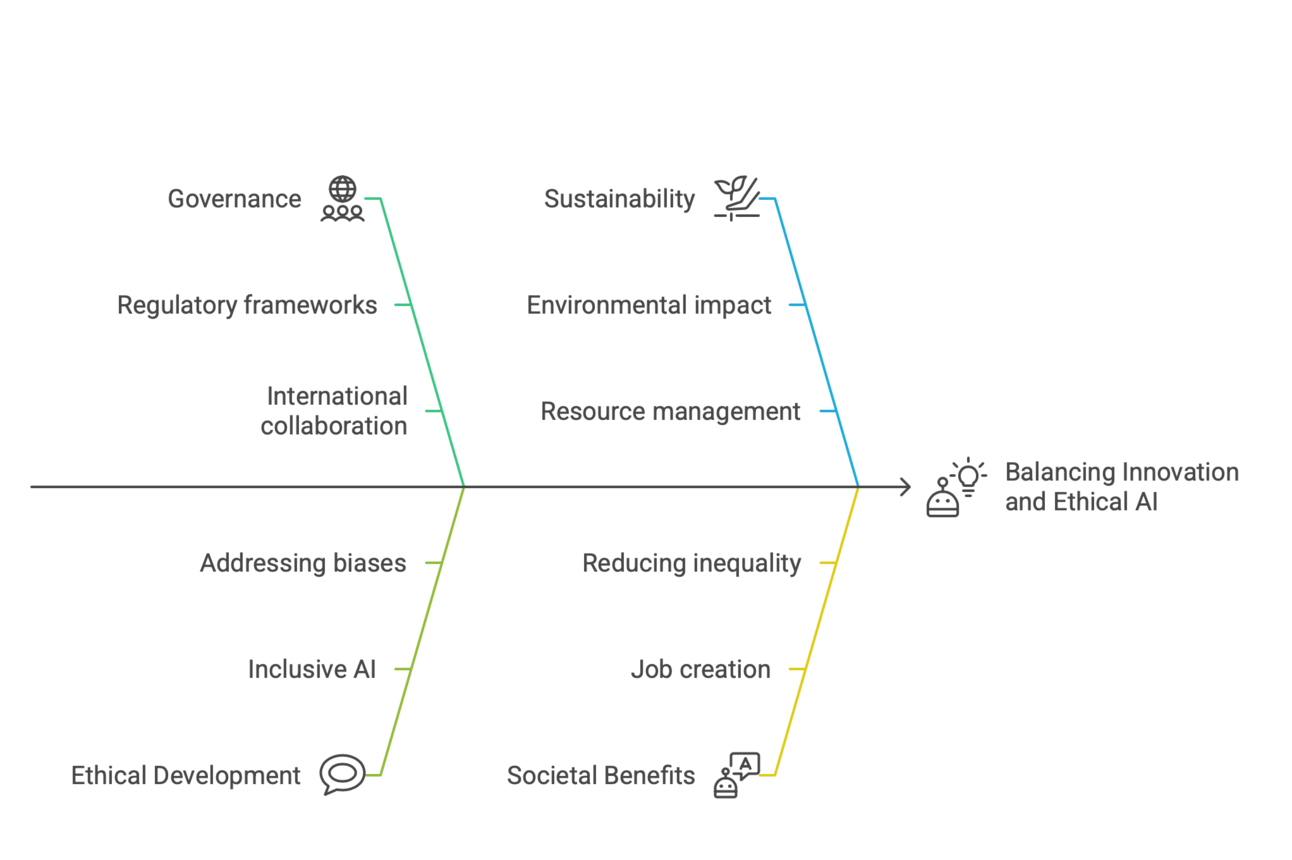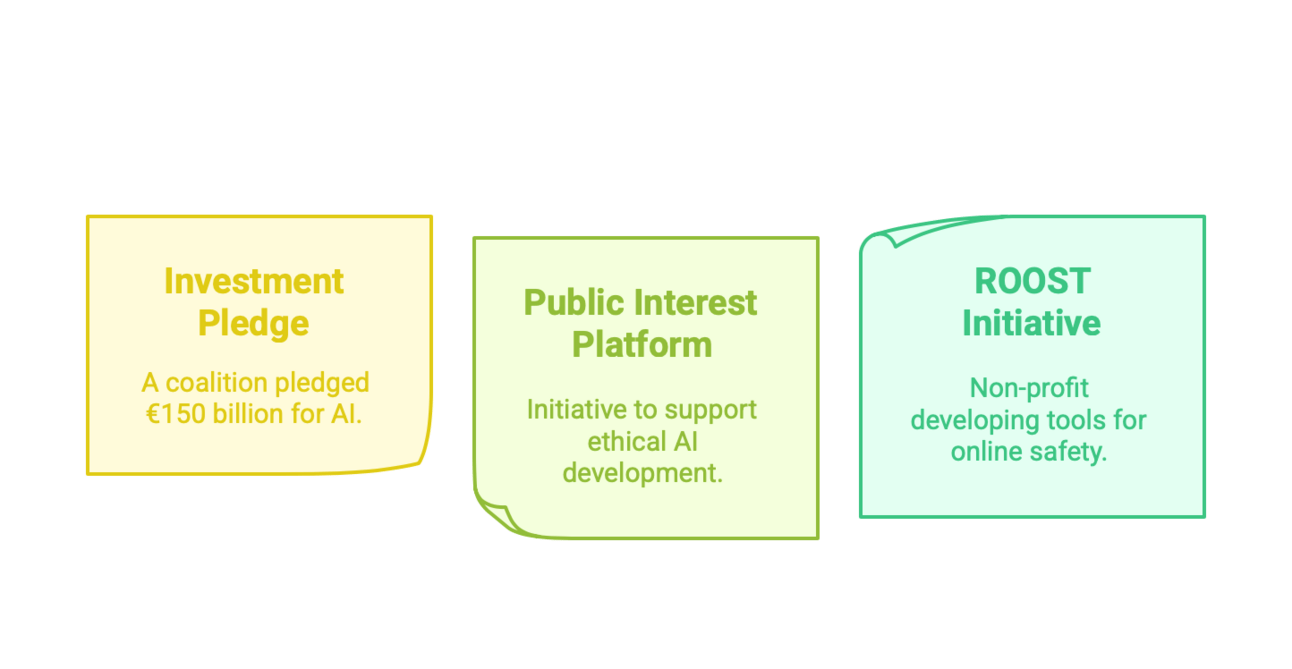- Solve for Earth.AI
- Posts
- All you need to know about AI Action Summit 2025
All you need to know about AI Action Summit 2025
AI Action Summit 2025: Key Takeaways, Leadership Insights, Controversies, and Future Outlook

The AI Action Summit 2025, held in Paris on February 10-11, brought together global leaders, policymakers, industry executives, and researchers to discuss the transformative power of artificial intelligence (AI). With AI rapidly reshaping industries and societies, the summit aimed to address critical questions around governance, regulation, innovation, and ethics. While the event showcased ambitious goals and global cooperation in some areas, it also exposed deep divides in priorities and approaches to AI governance.
Here’s a detailed breakdown of the summit’s key takeaways, leadership perspectives, controversies, and what the future might hold for AI.
General Overview of the Summit
The Paris summit marked a pivotal moment in the global discourse on AI. With over 80 countries represented alongside major tech companies and research organizations, the event aimed to strike a balance between fostering innovation and addressing ethical concerns. The central themes revolved around global AI governance, ethical development, sustainability, and ensuring that AI benefits society as a whole.
Key objectives included:
Establishing frameworks for inclusive and sustainable AI.
Encouraging international collaboration to regulate AI while promoting innovation.
Addressing risks such as job displacement, market concentration, and environmental impact.
However, despite its ambitious agenda, the summit underscored significant geopolitical differences in how nations approach AI regulation and development.

Key Takeaways from the Summit
1. Major Announcements
Several high-profile initiatives were unveiled during the summit:
€150 Billion Investment in European AI: A coalition of 20 corporations and startups pledged €150 billion over five years to bolster Europe’s AI ecosystem. This funding will focus on simplifying regulations for startups, fostering public-private partnerships, and advancing research in ethical AI.
Public Interest AI Platform: A new initiative was launched to support ethical and inclusive AI development. The platform aims to reduce digital divides while promoting transparency and accountability in AI systems.
ROOST Initiative: A non-profit effort aimed at developing open-source safety tools to combat online abuse and ensure safer digital environments.
2. Key Themes
The summit revolved around several critical themes:
Global AI Governance: Leaders emphasized the need for international cooperation to create inclusive frameworks for governing AI. However, a unified regulatory framework remains elusive due to regional differences.
Balancing Regulation with Innovation: Europe signaled a shift toward reducing regulatory hurdles to compete with the U.S. in fostering innovation. At the same time, ethical considerations remained central to European discussions.
Job Displacement and Reskilling: While acknowledging that automation could disrupt labor markets, leaders called for investments in reskilling programs but stopped short of proposing concrete policies.
Sustainability: Discussions highlighted the need for energy-efficient AI systems that align with global climate goals.

3. Partnerships
The summit also saw new collaborations:
French startup Mistral AI partnered with Helsing to develop real-time decision-making systems for defense applications.
An observatory on AI’s energy impact was launched in collaboration with the International Energy Agency (IEA) to monitor and mitigate environmental impacts.
What Top Leaders Said at the Summit

United Nations Secretary-General António Guterres
Guterres delivered a sobering message about humanity’s lack of preparedness for the rapid evolution of AI. He warned of growing inequalities as advanced AI capabilities remain concentrated among a few nations and corporations. Guterres proposed creating an Independent International Scientific Panel on AI to address governance gaps while urging governments to prioritize sustainable development by integrating energy-efficient AI into smart grids.
U.S. Vice President JD Vance
Vance took a more innovation-focused stance, opposing additional regulations that could stifle technological progress. He described American AI as the "gold standard" and emphasized minimal regulatory intervention. Vance also criticized European regulations like the Digital Services Act for imposing burdensome compliance costs on smaller companies.
European Commission President Ursula von der Leyen
Von der Leyen championed Europe’s unique approach to ethical governance. She announced €50 billion in public funding for European AI projects while emphasizing trustworthiness and human-centric design as core principles for future development. She positioned Europe as a leader in integrating ethical standards into industrial applications of AI.
French President Emmanuel Macron & Indian Prime Minister Narendra Modi
Macron and Modi co-chaired the summit with a focus on inclusivity and sustainability. They stressed bridging digital divides between developed and developing nations while ensuring equitable access to AI technologies.
Controversies Surrounding the Summit
Despite its ambitious goals, the summit faced several controversies:
1. U.S. & U.K.’s Refusal to Sign Declaration
The U.S. and U.K. declined to sign the summit’s "Statement on Inclusive and Sustainable Artificial Intelligence," citing concerns over excessive regulation stifling innovation. This refusal highlighted tensions between regions prioritizing rapid technological growth (like the U.S.) versus those advocating stricter oversight (like Europe).
2. Industry Influence Over Civil Society
Critics argued that corporate interests dominated discussions at the summit, sidelining civil society voices. Panels lacked focus on critical issues such as systemic biases in AI systems or their environmental impact, raising questions about whether broader societal concerns were adequately addressed.
3. Divergent Approaches to Regulation
There were sharp disagreements over how much regulation is appropriate:
The U.S., supported by some private sector leaders, advocated for minimal oversight.
Europe pushed for stricter rules emphasizing safety and ethics.
Developing nations like India called for inclusivity but expressed concerns about being left behind due to resource constraints.
4. Lack of Concrete Global Framework
While leaders agreed on broad principles like sustainability and inclusivity, no unified global framework emerged from the summit. Critics described this as a missed opportunity to address pressing challenges like surveillance misuse or monopolistic control by large tech companies.

Future Outlook: Where Do We Go From Here?
The Paris Summit underscored both opportunities and challenges in shaping a future where artificial intelligence benefits humanity equitably:
Global Collaboration Remains Elusive
The lack of consensus among major powers highlights how geopolitical rivalries are likely to shape future debates on AI governance. A truly unified global framework may remain out of reach unless nations find common ground on balancing innovation with safety.Ethical Development Will Be Key
As Europe doubles down on ethical governance frameworks, other regions may follow suit—especially if public trust becomes a competitive advantage for companies adopting these standards.Focus on Inclusivity
Bridging digital divides will require significant investments in infrastructure and education across developing nations—areas where partnerships between governments, corporations, and NGOs will be crucial.Sustainability as a Priority
With growing awareness of climate change impacts, energy-efficient AI systems could become both an ethical imperative and a market differentiator.Reskilling Workers
Governments will need to invest heavily in reskilling programs as automation disrupts traditional labor markets—an area where actionable policies are urgently needed but were notably absent from this summit.
Conclusion
The 2025 AI Action Summit highlighted both progress toward global cooperation on artificial intelligence and significant hurdles that remain unresolved. While leaders made bold commitments toward ethical development and sustainability, controversies surrounding regulation, inclusivity, and power dynamics revealed deep divides in priorities.
As we move forward into an era increasingly shaped by artificial intelligence, it is clear that collaboration—across borders, industries, and sectors—will be essential to ensuring that this transformative technology serves humanity equitably rather than exacerbating existing inequalities or creating new risks. The Paris Summit may not have provided all the answers—but it has certainly set the stage for critical debates that will define our collective future with AI.